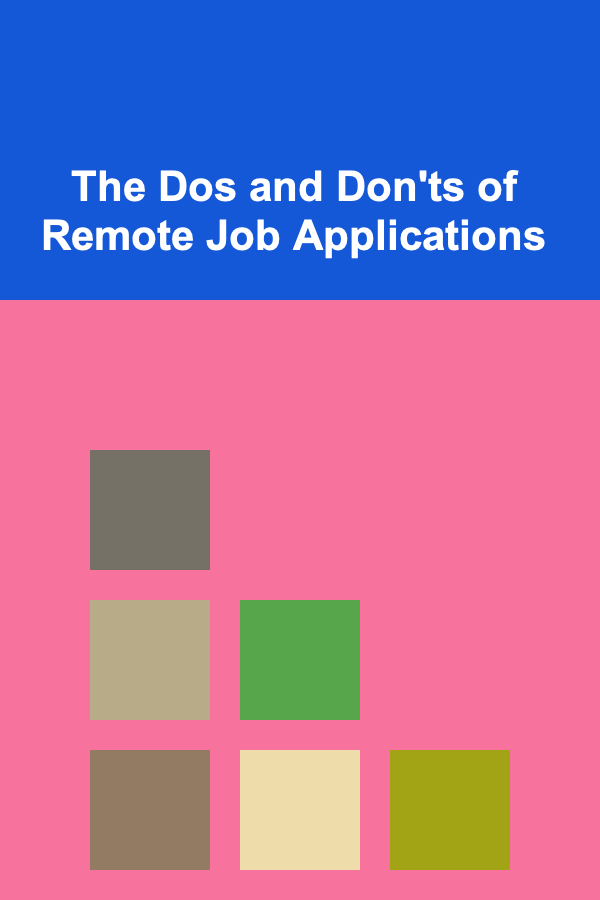
The Dos and Don'ts of Remote Job Applications
ebook include PDF & Audio bundle (Micro Guide)
$12.99$10.99
Limited Time Offer! Order within the next:

As remote work continues to become more prevalent, remote job applications have evolved into a vital part of the job search process. Applying for remote jobs offers a unique set of challenges compared to traditional in-office roles, requiring job seekers to approach the application process with strategic thought and preparation. Whether you are a seasoned remote worker or new to this style of employment, knowing the dos and don'ts of remote job applications can significantly increase your chances of landing your ideal role. This guide will provide actionable insights into effectively applying for remote positions.
The Dos of Remote Job Applications
1. Do Research the Company and Role Thoroughly
Before you apply for any remote job, it's essential to conduct thorough research on the company and the specific role you're applying for. In the remote job market, companies often look for candidates who are not only a good fit for the position but also understand the company's culture and mission.
- Company Culture: Research the company's approach to remote work. Do they have an established remote work culture, or is it a new transition? Some companies are hybrid, while others are fully remote.
- Role Expectations: Understand the key responsibilities and how the role aligns with your skills and experience. Remote positions often require more self-discipline, strong communication skills, and the ability to manage your time effectively.
Taking the time to understand both the company and the job role will not only help you tailor your application but also allow you to determine if the job aligns with your career goals and values.
2. Do Tailor Your Resume and Cover Letter for Each Application
When applying for remote jobs, it's crucial to customize your resume and cover letter for each application. A generic resume may be overlooked, especially in a competitive job market.
- Highlight Remote Experience: If you have prior experience working remotely, be sure to highlight that on your resume. Demonstrating your ability to work independently, manage your time effectively, and communicate across time zones can set you apart from other candidates.
- Skills Matter: Include soft skills such as communication, collaboration, self-motivation, and time management. These are critical for remote work and should be showcased clearly.
- Demonstrate Flexibility: Employers often seek candidates who are flexible and can adapt to different workflows. Be sure to mention any tools, platforms, or processes you're familiar with that help you collaborate remotely (e.g., Slack, Zoom, Asana, Trello).
Your cover letter should explain why you're interested in working for the company and how your skills align with the job description. Personalize your cover letter to show that you've done your research and understand the company's remote work needs.
3. Do Showcase Your Remote Work Setup
One important aspect that remote employers often look for is whether you are equipped to work from home. If you're applying for a remote job, your setup is a reflection of your professionalism and your ability to handle the technical demands of the role.
- Discuss Your Technology: Highlight any tools, hardware, and software you use that make you an effective remote worker. Mention things like your reliable internet connection, webcam, noise-canceling headphones, or ergonomic workspace.
- Prepare for Video Interviews: Since remote jobs often involve virtual interviews, ensure that your environment is tidy, quiet, and well-lit. Test your equipment (camera, microphone, and internet connection) beforehand to avoid technical issues.
By showcasing your remote work setup, you demonstrate that you are serious about working from home and are ready to hit the ground running.
4. Do Communicate Effectively
Clear, professional, and concise communication is a must when applying for remote jobs. Your ability to communicate well will often be tested throughout the hiring process---starting with your job application and continuing through the interview process.
- Follow Instructions: If the job application has specific instructions, follow them carefully. Employers are looking for candidates who can pay attention to detail and follow through on directions.
- Be Clear and Concise: When writing your application materials, avoid long-winded explanations. Keep your communication focused, making it easy for hiring managers to assess your qualifications.
Effective communication will be essential in your remote job, as most remote teams rely on digital platforms for collaboration. Make sure your application reflects this strength.
5. Do Be Transparent About Your Availability and Time Zone
Time zone differences can pose a challenge when applying for remote jobs, especially if you're applying for a role with a company based in a different country or region. It's essential to be upfront about your availability and how you plan to manage time zone challenges.
- Clarify Your Working Hours: Be clear about the hours during which you can be online and available for meetings. If you're applying for a global company, mention any flexibility you have in accommodating different time zones.
- Consider Your Team's Hours: When applying, consider whether your working hours will align with the company's expectations for availability and overlap with the team's working hours. If the company requires collaboration during specific hours, ensure that you can accommodate these needs.
By being transparent about your availability, you help the hiring team evaluate whether you will be a good fit for their remote work model.
The Don'ts of Remote Job Applications
1. Don't Apply Without a Professional Online Presence
In today's digital world, having an online presence is essential for remote job seekers. Failing to establish a professional presence can hurt your chances of being noticed.
- Neglecting LinkedIn: If you don't have an updated LinkedIn profile, you may miss out on opportunities to connect with hiring managers and recruiters. Ensure your LinkedIn profile is professional, aligns with your resume, and showcases your remote work experience.
- No Personal Website or Portfolio: Depending on the field, a personal website or portfolio can help you stand out. It can showcase your skills, work samples, and testimonials, and serve as a professional hub for potential employers.
Having a solid online presence not only makes you more visible but also boosts your credibility as a professional. It helps remote employers gauge whether you can thrive in an online-based work environment.
2. Don't Ignore the Job Requirements
It's easy to get excited about a job listing, but don't apply to a remote job if you don't meet the key qualifications. Remote employers typically expect candidates to have a high level of self-discipline, communication skills, and a proven track record in similar roles. Applying to a position for which you're not qualified can waste both your time and the employer's time.
- Don't Skip Important Skills: If a job posting specifically mentions that certain technical skills are required (e.g., proficiency in a specific software), don't ignore this. Ensure that you meet the key requirements before applying.
- Avoid Overpromising: Be honest about your abilities and experience. Don't exaggerate your qualifications in hopes of getting the job. Employers appreciate candidates who are genuine about their skill set.
Ensure that you fully understand the job requirements before submitting an application. If you're not a perfect match, you might still apply, but make sure you can demonstrate transferable skills.
3. Don't Forget to Proofread Your Application
Spelling mistakes, grammatical errors, and sloppy formatting can undermine your professionalism. In a remote environment, where communication is typically written, your application materials should be error-free and easy to read.
- Proofread Carefully : Take the time to proofread your resume, cover letter, and any other application materials before submitting. Consider using tools like Grammarly or Hemingway Editor to check for grammar and readability issues.
- Use a Clear and Professional Format: Your resume and cover letter should be easy to read. Avoid overcomplicating the design or using distracting fonts. Stick to a clean, professional format that emphasizes your skills and experience.
Attention to detail in your application will demonstrate your commitment to quality and professionalism, traits that are highly valued in remote workers.
4. Don't Be Passive in Your Follow-Up
Following up after applying for a remote job is essential, but many candidates fail to do so. A passive approach can make it appear that you're not fully invested in the opportunity.
- Send a Follow-Up Email: If you haven't heard back after a week or two, don't hesitate to send a polite follow-up email to inquire about the status of your application. This shows initiative and enthusiasm for the role.
- Don't Be Pushy: While it's important to follow up, be careful not to overdo it. Avoid sending multiple emails or constantly checking in. A single, polite follow-up email is usually sufficient.
Following up demonstrates that you're proactive, organized, and genuinely interested in the position.
Conclusion
Applying for remote jobs requires a combination of strategy, professionalism, and careful attention to detail. By following the dos and avoiding the don'ts outlined above, you can improve your chances of landing your dream remote job. Remember to tailor your applications, showcase your remote work readiness, maintain a professional online presence, and communicate clearly. With the right approach, you'll stand out from the competition and be well on your way to securing a successful remote career.

How to Add Character to Your Home Using Second-Hand Items
Read More
How to Choose the Right Appliance Cleaner
Read More
How to Design a Compact Yet Stylish Studio Apartment
Read More
How to Make a Checklist for Creating Your Product Launch Timeline
Read More
How to Stage Your Home When You Have Minimal Furniture
Read More
How to Use Real Estate to Hedge Against Inflation
Read MoreOther Products

How to Add Character to Your Home Using Second-Hand Items
Read More
How to Choose the Right Appliance Cleaner
Read More
How to Design a Compact Yet Stylish Studio Apartment
Read More
How to Make a Checklist for Creating Your Product Launch Timeline
Read More
How to Stage Your Home When You Have Minimal Furniture
Read More